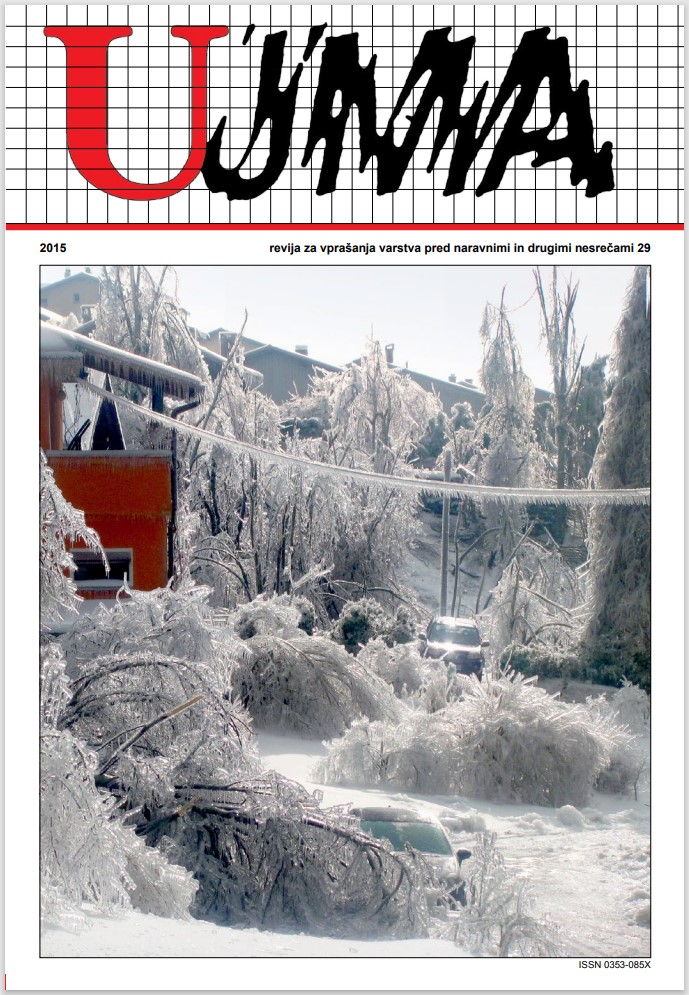ROLE OF FIRST AID TEAMS IN PROVISION OF CARE TO PERSONS AFFECTED BY NATURAL AND OTHER DISASTERS
Abstract
In the event of natural or other large-scale disasters, different civil protection and rescue units take numerous measures on the basis of interdisciplinary (co)operation in order to prevent or mitigate the adverse effects of disasters or reduce the number of victims. To this end, the Civil Protection and Red Cross First Aid teams may be activated. Their primary task is to give first aid to the injured and those suddenly affected by an illness, but they also help implement the basic measures of psychosocial care at the first level for those not injured but affected by a disaster. This has also been confirmed by the survey conducted within the framework of the 20th National First Aid Competition of Civil Protection and Red Cross First Aid teams in Koper in 2014.
References
Bauer, M., Jevšnik, M., 2008. Higiensko-tehnični ukrepi ob naravnih in drugih nesrečah. V: Prva pomoč: priročnik za bolničarje. Ljubljana: Rdeči križ Slovenije, 321–334.
Brvar, M., 2006. Zastrupitve. V: Prva pomoč: priročnik s praktičnimi primeri. Ljubljana: Rdeči križ Slovenije, 153–175.
Cassan, P., Markenson, D., Lo, G., et al. 2011. Psihosocialna pomoč/duševno zdravje. V: Mednarodne smernice za prvo pomoč in oživljanje. Ljubljana: Strokovni center za prvo pomoč pri Rdečem križu Slovenije – Zveza združenj, 102–15.
EFPA - European Federation of Psychologists Associations, 2007. Standing committee on disaster and crisi. Report to the general assembly 2007, Prague. Dostopno prek: http://www.efpa.eu/download/e7e47fd7c05724f816c2cb045922a471. <15. 4. 2014>
Hall, MJ., Ng, A., Ursano, RJ., Holloway, H., Fullerton, C., Casper, J. 2004. Psychological Impact of the Animal-Human Bond in Disaster Preparedness and Response. Journal of Psychiatric Practice 10 (6): 368–374.
Lavrič, A. 2009. Psihosocialna oskrba po nesrečah. Ujma 23 (1): 217–222.
Lavrič, A. 2011. Psihosocialna podpora reševalcem. Ujma 25 (1): 297–303.
Manjolovich, M., Antonakos, CL., Ronis, DL. 2009. Intensive care units, communication between nurses and physicians, and patients. Am J Crit 18 (1): 21–23.
Nemanič, T., 2014. Psihosocialna podpora, namenjena prizadetim (poškodovancem). V: Naloge vodje ekipe prve pomoči pri pripravi ekipe za preverjanje usposobljenosti. Priročnik za vodje ekip. Ljubljana: Rdeči križ Slovenije, 24.
Slabe, D., 2006. Zdravstveno varstvo v izrednih razmerah. V: Prva pomoč: priročnik s praktičnimi primeri. Ljubljana: Rdeči križ Slovenije, 627–636.
Slabe, D., Mahne, R., Melanšek, J. 2013. Prispevek ekip prve pomoči civilne zaščite in rdečega križa v sistemu zaščite in reševanja. Ujma 27 (1): 184–90.
Slabe, D., Šutanovac, R., 2014. Prva pomoč – ocena praktičnega dela. Ljubljana: Rdeči križ Slovenije.
TENTS - European Network for Traumatic Stress, 2009. TENTS Guidelines. Amsterdam: Academic Medical Center, University of Amsterdam.
Downloads
Published
Issue
Section
License

This work is licensed under a Creative Commons Attribution-NonCommercial-NoDerivatives 4.0 International License.
The articles are made available to the public under Creative Commons Attribution-NonCommercial-NoDerivatives 4.0 International (CC BY-NC-ND 4.0).


